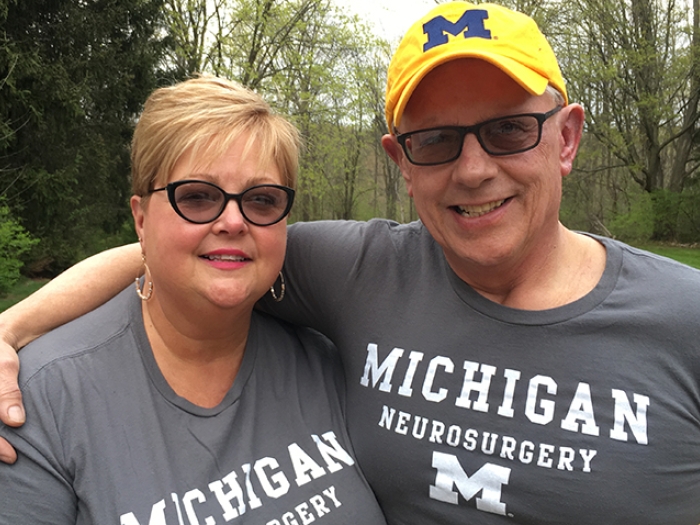A nurse learns firsthand the life-saving benefits of telemedicine after suffering a potentially debilitating stroke.
7:45 AM
Author |

When Sarah Phelps began her shift as a registered nurse at the MidMichigan Medical Center, she never expected the day would end with her on the receiving end of care for a stroke. And equally unexpected, that her care would be delivered via a telemedicine program that provided access to stroke experts from Michigan Medicine, hundreds of miles away.
Phelps, then 38, awoke that January morning in 2018 with a headache she couldn't shake. The Midland, Michigan, resident says the pain grew worse as she sat down for an early afternoon meeting, but it wasn't until she had trouble picking up her eyeglasses that she began to think something was very wrong.
As she got up from the meeting, weakness on her left side made it difficult to walk.
"I dragged myself to an elevator and up to my nurses station," she says. A coworker took one look at Phelps and realized she was having a stroke. "She immediately got me to a wheelchair and down to the Emergency Department," says Phelps.
Things moved at lightning speed after that.
MORE FROM MICHIGAN: Sign up for our weekly newsletter
While Phelps underwent a CT scan, the MidMichigan emergency room team was preparing to consult with Michigan Medicine neurologists via telemedicine. The consultation became especially critical when the CT scan revealed Phelps had suffered an acute ischemic stroke as a result of a bilateral vertebral artery dissection. A tear in the artery located toward the back of the neck was restricting blood flow to her brain.
Signs of a stroke from a vertebral artery dissection include:
-
Slurred speech
-
Sensory loss, weakness or clumsiness of the arm or leg on one side of the body
-
Vertigo or difficulty walking
-
Trouble swallowing
-
Neck pain, most notably on the same side as the dissection
Stroke from a vertebral artery dissection accounts for 10 to 25% of strokes in patients 45 or younger. Fortunately, more than 75% make a full recovery.
But expert treatment is critical for these patients, and telemedicine is one way of getting it as it allows healthcare professionals to evaluate, diagnose and treat patients at a distance using telecommunications technology.
"We are accessible within five minutes of being called," says stroke neurologist Mollie McDermott, M.D., director of the Michigan Medicine telestroke program. "We begin talking with the patient and their family and observing the patient's capabilities. We do a basic exam, for example, asking the patient to raise their arm or move their leg. We also can go into their medical record for background information and can view imaging and other test results."
Michigan Medicine stroke experts worked with the MidMichigan ER team to assess Phelps' condition via a high-definition video camera that enabled an up-close view of her as well as real-time communication.
Telemedicine offers specialty expertise not often available to many patients, especially those who are acutely ill. – Kurt Sieloff, M.D.Kurt Sieloff, M.D.
Because of the critical nature of her stroke, Phelps was transported to U-M's Comprehensive Stroke Center for monitoring and care. She returned home several days later, but when symptoms worsened, she again was evaluated via a telemedicine consult with Michigan Medicine's neurology team and transported to Ann Arbor after it was determined she had suffered a second dissection.
"A dissection like this is scary," says neurologist Kurt Sieloff, M.D., director of the Michigan Medicine teleneurology program. If either of the dissections had extended into Phelps' skull, the condition would have been very dangerous, which made it critical for her to be seen by stroke experts, he says. "Once inside the skull the dissection can be life threatening because it can result in a brain bleed."
Sieloff sees telemedicine as the merging of technology and medicine to meet the medical needs of patients who don't have access to specialists.
"Telemedicine offers specialty expertise not often available to many patients, especially those who are acutely ill. We can put the right doctor in the room with them very quickly and make important recommendations. We can look at things in real time while they still have the support of their physician and family."
McDermott agrees, noting that one goal of telemedicine is to keep people in their home communities.
"We ask them to be brought to U-M only when they have severe symptoms."

Treatment for acute stroke patients, in particular, is extremely time sensitive, says Sieloff.
"These patients often need treatment within a specific period of time for it to be successful. Working with ER physicians, we can help administer necessary care within that window."
He views Michigan Medicine telemedicine program as "support to physicians out there who are doing a great job but may not have the specialty expertise we can offer."
The telestroke and teleneurology programs at Michigan Medicine are involved with 15-40 consultations per week with partner health systems across Michigan.
"We're getting requests from other hospitals throughout the state for our telemedicine programs," says Sieloff, adding, "There are more and more doctors taking advantage of the skills we provide."
Patients who experience vertebral artery dissection undergo extensive neurological monitoring to make sure the dissection heals. Medical management may include anticoagulant or antiplatelet medication to prevent blood clots. In extreme cases, surgery may be required.
Phelps was closely monitored to make sure her dissections had healed and was treated with an anticoagulant medication. She'll continue to undergo regular neurological testing to rule out signs of subsequent dissections.
LISTEN UP: Add the new Michigan Medicine News Break to your Alexa-enabled device, or subscribe to our daily updates on iTunes, Google Play and Stitcher.
Phelps feels fortunate to have realized the benefits of telemedicine firsthand, calling it a life-saving advancement in medicine.
"Specialists from hundreds of miles away were looking at my scans, accessing my records and talking with me as if they were in the same room. It's amazing."

Explore a variety of health care news & stories by visiting the Health Lab home page for more articles.

Department of Communication at Michigan Medicine
Want top health & research news weekly? Sign up for Health Lab’s newsletters today!





